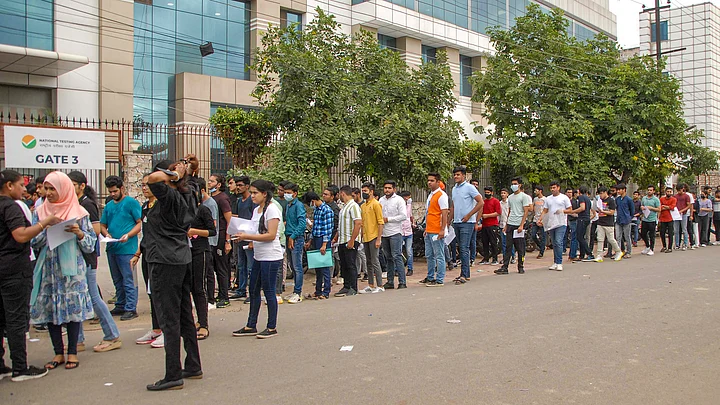After a long wait for students, the Common University Entrance Test (CUET) Undergraduate results were announced at around 5:30 am on Friday, 16 September.
Students can see their percentile as well as their normalised scores on the scorecards. Students can check https://cuet.samarth.ac.in/ or https://nta.ac.in/.
A total of 86 universities participated in the CUET this year, conducted by the National Testing Agency (NTA) in six phases from 15 July to 30 August, with a total of 14,90,000 candidates having registered for the examination.
But how are the admissions going to take place? How have the results been calculated? Which are the participating universities? Here’s what we know.
What are normalised marks?
The University Grants Commission (UGC) Chairperson Mamidala Jagadesh Kumar wrote in The Indian Express that the equipercentile method will be used.
The equipercentile method means that normalised marks of each candidate will be calculated using the percentiles of each group of students in a given session across multiple days for the same subject.
The method will use the same scale for all candidates irrespective of which session they have appeared in. This will make their performance comparable across sessions.
The final score is supposed to indicate a candidate’s performance in comparison to others who gave the same exam.
The normalisation formula was decided by panel of professors from Indian Statistical Institute, IIT Delhi and Delhi University.
Which central universities participated in the exercise?
54 central universities participated in the CUET. Some of these include:
Delhi University
Banaras Hindu University
Aligarh Muslim University
Jamia Millia Islamia
Jawaharlal Nehru University
University of Allahabad
Guru Ghasidas Vishwavidyalaya
Visva-Bharati University
North-Eastern Hill University
University of Hyderabad
Manipur University
Rajiv Gandhi University
Pondicherry University
Indira Gandhi National Open University
What are the next steps for students?
Students who have given the examination can check the websites of the universities for more details regarding their respective admission procudures.
Merit lists will be prepared by the participating universities. Further, on the basis of the score card of the CUET (UG) 2022 provided by the NTA, the universities will decide about their individual counselling.
The Delhi University, for example, launched the admission portal for DU, called the Common Seat Allocation System (CSAS-2022). The portal closes on 3 October.
The application process comprises three phases – in the first phase, students have to fill the forms for DU. In phase two, candidates will fill in their preferences, and in the third phase, there will be seat allotment-cum-admission.
This is the first time that the results of the CUET will decide who gains admission to DU, instead of cut-off lists.
Click here to read our FAQ on how and where to apply for DU.
How important are class 12 marks for getting admission?
The CUET was conducted in order to reduce the weightage of the class 12 marks to a certain extent. The students should have passed the Class 12 board examination with at least 50 percent in aggregate marks to be eligible for applying to the well-reputed universities.
What do students do if they have grievances?
For grievances related to results, students can write to the NTA. Regarding admissions, students need to write to the university where they have applied. If the issue is still not resolved, students can lodge their complaints on the UGC's E-samadhan portal.
(At The Quint, we question everything. Play an active role in shaping our journalism by becoming a member today.)
